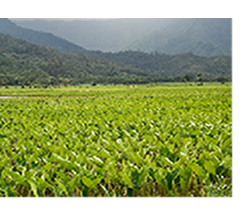Culture and Biotechnology
Cultural and religious beliefs can play a role in how individuals feel about the use of genetically engineered food crops.
 A controversial issue in Hawaii has been using biotechnology to improve taro varieties. Hawaiian taro (kalo) is a fundamental part of Hawaiian culture and traditional diet. Taro is the "older brother" of the Hawaiian people and to be cared for and respected.
A controversial issue in Hawaii has been using biotechnology to improve taro varieties. Hawaiian taro (kalo) is a fundamental part of Hawaiian culture and traditional diet. Taro is the "older brother" of the Hawaiian people and to be cared for and respected.
It also is a crop that is being threatened by invasive plant diseases. Up to 50 percent of kalo production might be lost because of diseases each year. The number of named Hawaiian taro varieties has declined dramatically during the past 100 years, from more than 400 in the early 1900s to fewer than 60 today. These losses are largely attributable to the assaults of these invasive pests (such as pocket rot).
Researchers at the College of Tropical Agriculture and Human Resources (CTAHR) are very interested in helping farmers avoid losses. Research using traditional plant breeding is being done to develop disease resistant taro varieties. The natural resistance to pests found in closely related varieties is used very effectively this way. The problem comes when there is little natural resistance in the plants available for traditional breeding. This is when genetic engineering can be a beneficial tool. If a gene for resistance to the disease can be found in other plants, it can be transferred to plants that have little or no resistance. The plants do not have to be closely related as in traditional breeding.
Traditional breeding was used to develop taro with resistance to leaf blight, but this resistance breaks down if environmental conditions favor the disease. Research was done to see if genes from rice, wheat or grape vines could improve resistance. Genetically engineered Chinese Bun long taro showed improved resistance to leaf blight during laboratory testing, however Hawaiian groups raised concerns that GE varieties of taro might threaten the purity of Hawaii taro. Due to strong community sentiment, the University of Hawaii reached an agreement that no further GE based research on Hawaiian taro would be done until there was further discussion with the Hawaiian community. (CTAHR agreement PDF, HTML)
While some Hawaiians feel strongly that no GE modification is acceptable, not all agree with the decision to stop GE research. The Solomon Islands have had devastating taro losses due to viral infestation and Hawaiian varieties are susceptible if the infection is imported. Some feel that a compromise would allow laboratory based research on non-Hawaiian varieties to continue so that there could be more options if these known viral diseases spread to our islands. For them, a modified plant would be a better choice than no Hawaiian taro at all.
Foods are part of cultural identity and in some cases are tied to religious beliefs. In a global economy, determining who has the ownership of plant genomes and the rights to determine their use has raised important questions that do not have easy answers. Agricultural crops were all developed from wild plants that were identified as edible and improved over many generations. Often, the crops created the culture as much as the culture created the crops and the two cannot be separated.

